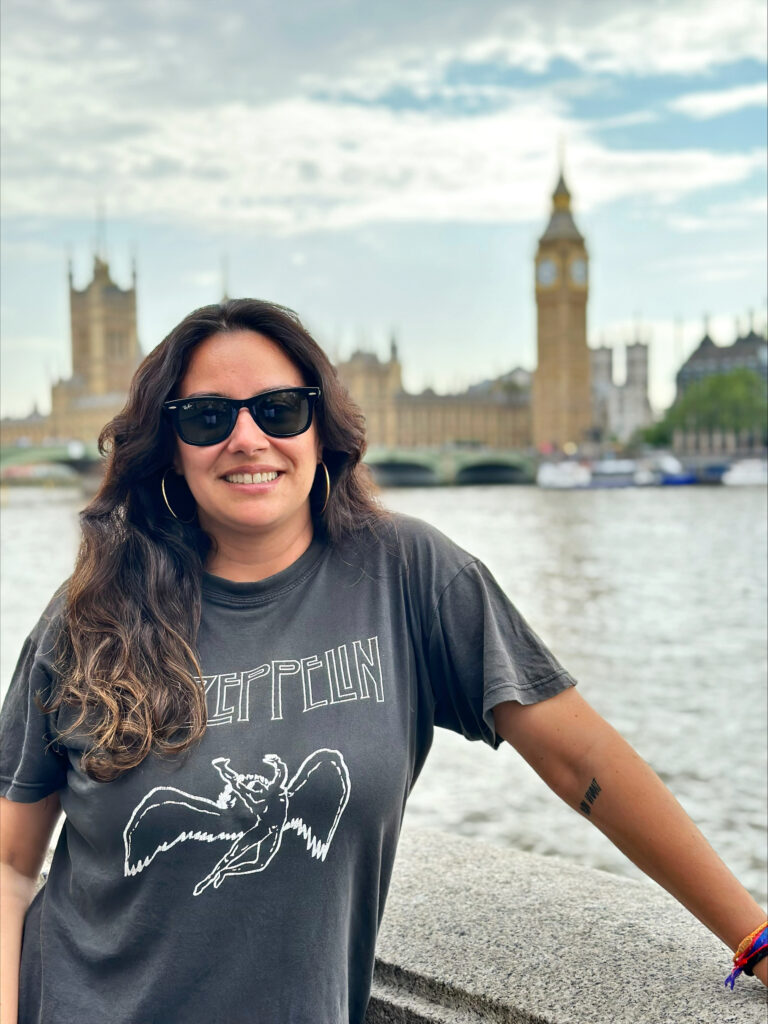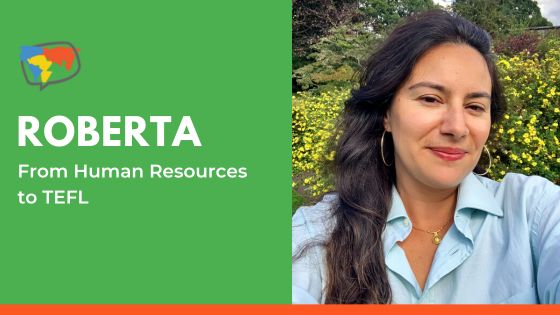Preparing for the IELTS exam and teaching English to monks abroad inspired the TEFL journey of Roberta Serralvo, from Brazil. Eight years after taking her newfound career to her home country, she’s now teaching English at a school, online, and independently. She shares her story of how she made the leap to TEFL from working in human resources, some of the rewarding moments she’s had with learners, and her strategies for teaching different age groups.
Hello, Roberta! Can you tell us a bit about yourself?
I’m Roberta. I’m from Brazil. I was born in Sao Paulo, the capital, but nowadays I live in Jundiaí, which is about 40 minutes away from Sao Paulo.
In Jundiaí, I have a more laid-back lifestyle, but I often visit Sao Paulo because I have many friends and a great social life there. I also love traveling. Whenever I have a break coming up, and enough money, I try to plan a trip. I think when I share stories about my trips, the benefits of knowing English, and where it can take you, it’s really appealing to students because I can tell that, regardless of their age or situation, they’re all looking for inspiration and a way to build confidence in English. I think this is really important. So, I talk about my trips in class. Additionally, I love Brazilian culture, and I love the Carnival!
Interested in a career teaching English? Learn about Bridge’s most popular TEFL Certificate, the 120-hour Master Certificate, which qualifies you for jobs worldwide.
What inspired you to become an English teacher?
I used to work in the human resources area, recruiting and training employees. Then, I did an internship in Australia. My idea back then was to live in a different country and get to know a different lifestyle so I could return to Brazil with a different perspective. I was also studying English over there, and my classmates were all preparing for the IELTS exam. I felt like I was more comfortable with the test because, for me, it would be a certificate to bring back. But for my classmates – most of whom were from Thailand, Vietnam, Japan, and China – it was a must. They had to have the certificate in order to enroll in a university. And then we decided to create study groups wherein we shared our knowledge. I realized that I liked doing this and I loved training, practicing, and sharing. And then a friend of mine, who is from South Korea, asked, “Why don’t you become a teacher?” But I thought I wasn’t prepared for that.
How did you land your first English teaching job?
After my Australia trip, I spent a month traveling around Thailand. As I was already running out of money, I tried to save as much as I could. In Chiang Mai, a town in northern Thailand which has many Buddhist temples, one of the monks realized I was there every day.
He started a conversation with me and asked, “Would you like to be a volunteer teacher here? In exchange, we’ll give you a vegetarian lunch and dinner.” I accepted and my first official students were novice monks, from 14 to 24 years old, who were from Myanmar and Thailand!
It was very laid-back, and I think that Thai people are very warm, kind, and helpful. We were just sharing experiences, correcting pronunciation, and sorting out some questions they had. It was a great start, and I thought it was something that brought me joy because I was not happy in human resources anymore.
As soon as I returned to Brazil, I organized my CV and started to search for jobs as an English teacher. And eight and a half years later, I’m still working as an English teacher!

Tell us a bit about your experience teaching students from a different culture.
The first thing is that they were not Brazilians, so there was no way of translating some of the words. It’s a very different culture. For instance, there was one word that was pretty hard: jealous. They didn’t know the word, as they never experienced feeling jealous. Then, I wrote the word and explained that feeling jealous is when you don’t want to share something or someone with anyone. And the boy said, “Why wouldn’t I want to share something that I really care about with another person that I really care about?”
Read about code-switching in EFL classrooms and when to use this practice.
Now you’re teaching English in Brazil. What do you like best about teaching in your home country?
When I’m preparing for class, it’s easier for me to capture things from our culture. I know what people are watching or listening to here in Brazil. So, I think this makes it a bit easier to prepare lessons. When I started to teach Chileans or Argentinians, I had to go over their cultures to understand them a bit better. With my Brazilian students, we can easily share experiences in order to use English outside the textbooks.
Read about last-minute ESL lesson plans that can be adapted for any class.
You’re currently teaching in a school and online, and you have private learners. Can you tell us about each job?
I teach children in person at a private elementary school. My students are nine to 10 years old, and it’s inspiring to be with them. But they grow up so fast! So, the games we used to play in the first semester don’t work anymore in the second semester!
It’s also really good to be in the classroom and use the smartboard with the pens. This is also how I learned how to be a teacher, so some activities and games come back to my mind. Then, I take these to my online lessons.
I also teach Business English online to adults with Bridge, and I think this is starting to account for the majority of my students. When I have time in my schedule, I also try to fit in some private tutoring, maybe with someone who’s preparing for the IELTS or Cambridge exam or someone who has a very important presentation.
Learn about the essentials of teaching Business English online and in person.
How do you adjust your teaching methods to different age groups?
With children, I use a book from Cambridge. The classes are more about getting them used to listening to English and communicating in simple situations.
With Bridge, we use the Business English materials from Pearson. I love this material. In the past, I didn’t have a book for teaching Business English.

You shifted to the virtual classroom during the pandemic. How’s your online English teaching experience been?
I think I’m more used to it now. Before the pandemic, I was teaching face-to-face full-time, and then I had to transition everything to online. I’m not going to lie, it was hard for me. At the same time, I took the CELTA online, which I think made me really prepared for the online environment.
Need training in teaching online? Explore the Specialized Certificate Teaching English Online.
You also specialize in teaching or preparing students for IELTS and Cambridge tests. Which materials do you use to help your students?
My teaching techniques are inspired by my own experiences in preparing myself for the FCE and IELTS. I use one book focused on vocabulary and another book with the mock tests. Then, we compare the students’ scores and the time they took to complete the mock tests every week. I also remind them of the time limit they’ll have on the day of the test.
There are many things that can make the student very nervous, so I try my best to make the student ready for the day. When it’s possible, depending on the exam or the English level of the student, I also try to use authentic materials like articles from the Guardian or The New York Times or even Instagram posts.
Read about eight tips for teaching English for test preparation.
What do you do when you’re not teaching?
I only work from Monday to Friday and usually have my afternoons free, so I use them to clean my house, go to the gym, and be with my two cats, Teresa and Rio.
Can you share a particular experience in your teaching career when you felt like you made a difference in a student’s life?
One that really touched me this year was a Brazilian student who moved to London with his husband. He didn’t speak English when they made the move, and right away, we started working very hard because he was very anxious. I told him we should take one day at a time.
He first worked as a janitor for five years. I suggested taking a Cambridge exam to take his English to another level and began pushing him a lot. He started listening to podcasts and reading short texts on social media and magazine articles. Then, the people at his company realized he was putting in a lot of effort and he was promoted. Now, he’s the assistant of facilities! He’s very happy, and this was all due to his efforts.
I also had another student who was at university here in Brazil. She applied for a one-year scholarship program in France, but the interviews and lessons were in English. We prepared a lot and she was accepted! I’m very proud of her, and she loves France!

You took the Specialized Certificate in Teaching Business English. Why did you decide to add this certification to your qualifications?
Teaching Business English was an area I didn’t feel as comfortable teaching. As I mentioned, I didn’t have a book to teach Business English in the past, and I used to get lessons from the internet to come up with authentic material.
Also, I was used to being in touch with the parents of my students or an adult paying for his own course. But when you have to deal with the stakeholders, it is a different approach, from presenting grades to being flexible with students. So, more than the content of the book, the specialized course opened my eyes to working with companies. I’m not only dealing with the student; I’m also dealing with a company that’s investing in its employees.
How would you like your career to develop further?
Something I envision is working more with people from different cultures. This is something that I love. When I visited Vietnam, I really thought it would be so good to work with these people and learn so much more about their culture. This is something that really inspired me.
I’ll also keep learning to work on improving my procedures. In my previous job, at Cultura Inglesa, where I worked for almost six years, every year they would provide professional development and bring in people to present different software, different readers, and different ways of working, so everything was inspired. When you’re just one teacher, it’s harder to search for this inspiration. This is why I like to work for a company so much. I have many teachers I can collaborate with, and it’s wonderful to exchange ideas with other teachers.
Read about six ways teaching abroad can optimize your personal and professional growth.
Do you have any tips for English teachers who want to work in Brazil?
Never stop studying. If you review the work you’ve done each year, you’ll see your growth as a teacher. But there’s always room for improvement. One goal that I had when I was living in Australia was to understand an episode of “Game of Thrones” in English. Now, I can easily understand. So, it’s about doing the work, listening to podcasts, reading books in English, or whatever works for you.









